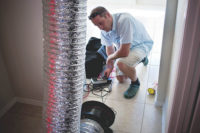Wherever you fall in this range, whatever your excuse, you’re right that deciding to learn the home-performance market would require a massive commitment of your time, energy, and effort. So why bother?
Well, if you listen to those who have made the leap and are at the forefront of home-performance contracting (HPC), you just might be convinced that this is a trend you can’t risk ignoring.
Listen to the Leaders
For starters, take Rob Minnick, president and CEO of Minnick’s Inc., Laurel, Md. He began investigating home performance eight years ago, and, in his own words, he “dove headfirst into it six years ago.”
Today, Minnick likes to tell other HVAC contractors: “Home performance is a part of what we do. You’re going to be on board whether you want to or not. It’s not going away.”
There’s also Rich Morgan, president of Magic Touch Mechanical, Mesa, Ariz. “We expanded our product and service offerings in the HPC arena almost six years ago,” Morgan said. “It is far and away our fastest-growing set of products and services, so it’s extremely popular with our customers.” And then there’s Fred Hutchinson, CEO of Hutchinson Plumbing Heating Cooling LLC, Cherry Hill, N.J., who said that HPC work leads to more referrals and higher job profits.
“It makes you a better contractor, and it is a real differentiator,” Hutchinson said.
Plus, he believes that there’s an ethical element to home-performance contracting — that it’s about doing the right thing for the homeowner. “Once you know, it is kind of wrong not to present the choice,” he said.
So if your career and company have been built on doing the right thing for the customer, these testimonials should certainly be drawing your attention.
Contractors’ Wish Lists
Another thing that should get your attention is, of course, the money to be made in the HPC market. HVAC professionals who’ve embraced whole-house solutions are boasting financial gains.
“Some of the biggest challenges traditional HVAC contractors face across the country are seasonal workload challenges, cost-effective marketing, the low-price ‘chuck in a truck’ competition, differentiation, profitability, callbacks, quality control, and more,” said Michael Goater, a performance success coach with Comfort Institute Inc. “HPC eliminates these challenges.”
How is that possible? Goater continued: “If you provide a valuable service that is focused on improving the quality of someone else’s life, cost is irrelevant. The contractors across the country that are focusing less on equipment and more on customer solutions are the ones making the most profit with the least amount of downtime. They’re assuming the least amount of risk.”
In a similar vein, when Michael Rogers, president of OmStout Consulting, talks about why HVAC contractors should start providing HPC services, his list of reasons reads like every contractor’s dream: “increased profitability, increased employee job security, higher revenue, higher margins, reduced seasonality, higher customer satisfaction, and fewer comfort callbacks.”
Both the increased profitability and increased employee job security are the result of higher revenue, he explained. “Average install revenue can increase $3,000-$5,000. Some report higher returns, but I prefer to be more conservative with expectations.”
Goater also shared a few impressive stats about the revenue that HPC-trained technicians can bring in.
“On average, well-trained home-performance specialists have closing rates of 75 percent or higher, their average ticket runs $2,200 higher when compared to traditional HVAC tickets, and they’re operating above double-digit net profits,” he said.
Morgan said, over the last six months, he’s welcomed higher average invoices thanks in part to multiple add-on HPC products and services. “We have differentiation from HVAC-only contractors, and the ability to explain higher price and therefore achieve higher profit margins,” he said.
The Learning Curve
HPC requires a complete commitment; otherwise, you’re likely to get left behind. “HPC is not for the faint of heart,” Morgan said.
Hutchinson said that a common failure is for a contractor to only go “half in” when it comes to HPC.
And according to Minnick, a failed HVAC-to-HPC transition is likely due to a lack of discipline.
“You have to be disciplined on the decision you make all the way across the board,” he said, adding that contractors need to commit to taking on a big educational challenge.
Minnick’s zeal for HPC education is evident in the credentials that he carries, including certifications from Building Performance Institute Inc. (BPI), Leadership in Energy and Environmental Design (LEED), and Residential Energy Services Network (RESNET). And his company also created Minnick University, an online education portal that offers more than 150 online classes designed to help contractors prepare for certification exams.
Minnick was fortunate to have two brothers in the company who he could rely on to keep things going while he immersed himself in HPC education. However, he pointed out that contractors who don’t have such support can look to partner with an energy auditor to get over the learning curve.
It isn’t all going to click on day one, he said, warning, “Be ready for some struggles and speed bumps.”
Morgan echoed this sentiment. “There will be years of expensive trial and error before you get it dialed in,” he said. “It is undoubtedly a serious investment of both time and money, and it will be years before you’re recognizing the fruits of your labors and receiving a return on your investment.”
But, he noted, it takes contractors years to perfect their craft in HVAC, so it’s not surprising that it will take a similar effort to do it all again for HPC. And, he pointed out, “A contractor’s HVAC knowledge will definitely help in the process.”
Morgan also commented on the importance of both internal and external training, and noted that his staff are certified as BPI Building Analysts and Envelope Specialists, and are recognized as RESNET Certified Home Energy Raters (HERS).
Hutchinson has more than 20 people on his staff with BPI certifications, and said such credentials have resulted in a “good payoff in profitability, homeowner satisfaction, and referral business.”
In spite of the work and education demands in HPC — or perhaps because of them — Minnick said he “loves every minute of it.”
Satisfaction
Once you take the plunge and decide to move into the HPC market, you won’t be the only one who benefits — your customers will, too.
According to Minnick, with HPC, the main focus is still on solving health and comfort issues for his customers.
Morgan added that his HPC customers proudly exhibit lower utility bills, better balanced temperatures throughout the home, greater humidity control, and a noticeable reduction in airborne particles.
“We have been able to demonstrate both a guaranteed efficiency and/or comfort improvement in more than 90 percent of the hundreds of jobs we’ve completed,” he said.
Hutchinson also emphasized HPC’s numerous customer benefits.
“When we speak to homeowners that took the HP path, they often say, ‘Hutch, I wasn’t sure we’d save the money you said we would, but we are — and even more amazing is that I never knew I could be so comfortable in my home.’ ”
Publication date: 10/7/2013
Want more HVAC industry news and information? Join The NEWS on Facebook, Twitter, and LinkedIn today!












